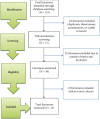Adverse Drug Reaction Reporting in Ethiopia: Systematic Review
- PMID: 32851089
- PMCID: PMC7439161
- DOI: 10.1155/2020/8569314
Adverse Drug Reaction Reporting in Ethiopia: Systematic Review
Abstract
Adverse drug reactions are major global public health problems and an important cause of mortality. Problems related to medicines safety can emerge from real-life medication use due to increasing access to complex treatment of concomitant infectious and noncommunicable diseases, hence leading to a higher prevalence of drug-related problems. The objective of this review was to assess the knowledge, attitude, and practice of adverse drug reaction reporting among health care professionals in Ethiopia. Relevant literatures were searched from Google Scholar, PubMed, Hinari, Web of Science, Scopus, and Science Direct using inclusion and exclusion criteria. From 133 searched studies, 13 studies were reviewed. The knowledge and attitude of health care professionals towards adverse drug reaction reporting ranged from 22.68% -60.33% and 47.22% -67.14%, with averages of 41.50% and 57.18%, respectively. While 46.93% encountered adverse drug reactions and 41.8% reported in the last 12 months. One-third (34.15%) of health care professionals do not know how to report adverse drug reactions. Fearing to report, uncertainty about the adverse drug reaction, concern about reporting generating extra work, thinking that one report does not make any difference, nonavailability of reporting forms, and lack of feedback from regulatory authority were the stated reasons for underreporting. We conclude that the knowledge, attitude, and practice of health care professionals towards spontaneous ADR reporting were low. Conducting awareness and educational training and implementation of electronic reporting can improve the ADR reporting practice.
Copyright © 2020 Abel Demerew Hailu and Solomon Ahmed Mohammed.
Conflict of interest statement
The authors report no conflicts of interest in this work.
References
-
- World Health Organization. WHO Guide Lines on Safety Monitoring of Herbal Medicines in Pharmacovigilance Systems. World Health Organization; 2004. July 2020, https://apps.who.int/iris/handle/10665/43034.
-
- Organization WH. The Selection of Essential Medicines. World Health Organization; 2002. July 2020, https://apps.who.int/iris/bitstream/handle/10665/67375/WHO_EDM_2002.2_en....
-
- Kamtane R. A., Jayawardhani V. Knowledge, attitude and perception of physicians towards adverse drug reaction (ADR) reporting: a pharmacoepidemiological study. Asian Journal of Pharmaceutical and Clinical Research. 2012;5(3):210–214.
Publication types
MeSH terms
LinkOut - more resources
Full Text Sources
Medical
Research Materials


